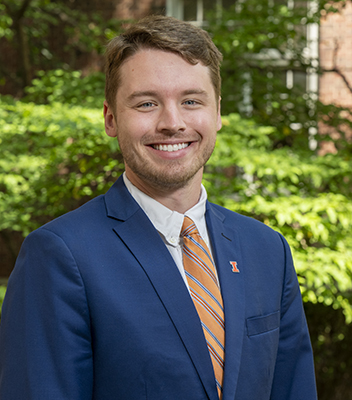Sep 17, 2024
Riley League combatting waste and fraud in healthcare
Riley League, new assistant professor in the Department of Finance, comes to Gies after spending a year as a postdoctoral fellow at the National Bureau of Economic Research, a nonprofit organization that facilitates research and analysis of major economic issues, where he worked on research on aging and health. He came to NBER just after completing his PhD in economics at Duke University on “Administrative Burdens in the US Health Care Sector.”
“We spend a trillion dollars a year on administration costs in healthcare,” League said. “It’s a big and important slice of the economy. Yet we don’t understand it super well.”
League is particularly interested in how these costs can impact actual patient care. “You can think of my research as being about quality and waste and getting the most value we can out of the healthcare sector.”

One particular industry that he focused on is the dialysis industry. This is a particularly expensive sector of healthcare that has experienced large amounts of wasteful spending and fraud. League has focused on ways to reform that industry to incentivize judicious spending while maintaining high quality of care.
In a recent paper he wrote while at NBER, League and his colleagues looked at fraudulent use of ambulance rides for transporting patients to their dialysis sessions. The US government was spending billions of dollars for ambulances to transport patients to dialysis sessions. “There were scores of federal cases alleging all sorts of bad behavior relating to inducing patients to take these rides when they were blatantly not medically necessary so that the providers can bill the government a lot of money,” League explained. “We looked at how the government can combat this behavior and control wasteful spending and fraud.”
They examined three approaches to combatting waste and fraud: criminal lawsuits, civil lawsuits, and changes in regulations. In the end, it was the third option that had the biggest impact. By altering regulations to require providers to receive preapproval to transport patients by ambulance, Medicare spending fell by nearly 67%, compared to a reduction of 20-25% through criminal suits and no effect from civil litigation.
Though this had a big impact on the cost, there was no impact on patient care. At the same time, there was no reduction in patient care. “Going in, we were very worried that when governments either ran these antifraud lawsuits or implemented this regulation that it was going to have negative impacts for patients,” League said. “It was possible that when we reduced ambulance rides by two-thirds -- that for at least some patients that no longer had access to an ambulance to take them to dialysis -- there would be negative impact for them. So we were very surprised to find that wasn’t the case.”
A research project of this type required examining a large amount of data. So it’s not surprising that he will be teaching FIN 550: Big Data Analytics in Finance for Predictive and Causal Analysis. It’s a course that introduces concepts and techniques of data analytics and shows how they can be used for making predictions and for distinguishing correlation and causation within financial and economic analysis. “This will be my first time teaching this particular course,” League said. “It’s similar to courses I’ve taught or TA’d for in the past. I’m looking forward to it.”
What he is also looking forward to is enjoying the culture of Gies Business. It’s a culture that is recognized even outside of the university. League recalls that “whenever I was telling people where I was going and my new affiliation, everyone said, ‘Oh, man, the people there are so great. Their research is awesome, and the people are amazing. They’re so nice, they’re so helpful.’ It’s hard to build something like that into the culture of an institution, but clearly, that is something that has happened here. And I think that is really special. I think that the colleagues that I have here are second to none.”


